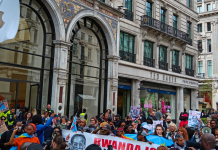Jan Ladzinski introduces Wladyslaw Szlengel’s poem, Counterattack, on the 72nd anniversary of the start of revolt in the Warsaw Ghetto
Exactly 72 years ago the Warsaw Ghetto saw an unexpected revolt. In the years of the Nazi occupation as many as 400,000 Jews were crowded into an area of 1.3 square miles, deprived of food and finally deported by the German troops, with the help of Jewish collaborationist police, to the death camp of Treblinka.
On 18 January 1943, when another wave of deportations began, Jewish underground organisations decided to resist. There were perhaps only some 50,000 people left in the Ghetto by that point, and no more than a 1000 members of the underground combat organisations. The initial resistance, meagre as it was, was a shock that forced the Nazis to halt deportations until 19 April when they moved again in full force. Between January and April the resistance organisations, among them many members of the socialist Bund, established a degree of authority in the Ghetto, building bunkers, smuggling weapons and executing collaborationists. They were preparing for an inevitable confrontation in which they stood no chance.
There was no chance for victory and virtually no chance for survival, but the Jewish resistance that culminated in the Uprising on 19 April was not futile. The very act of taking up arms, organising for a battle and executing collaborators had the power to return the lost human dignity to the Jews of the Warsaw Ghetto. The people regained their agency and when they died, they died as fighters not victims. Nobody expressed the power of resistance to restore humanity to the downtrodden better than Wladyslaw Szlengel in his poem Counterattack. Szlengel, born in 1914, wrote it in reaction to the first clashes in the Ghetto in January and it was probably one of the last poems written before his death in the Ghetto Uprising.
Counterattack
Peacefully they walked to the train,
Sick and tired of the daily battle,
Doggedly gaze into the brutal eyes did
The cattle.
The handsome officers gloated
That they are bothered by nothing,
That with a dull step the hordes are marching,
And only for diversion
The whips cracked,
Slashing their faces!
The throng in silence sank to the ground,
Before it dissolved in sobs in cattle cars,
Their blood and tears,
Trickling into the sandy ground,
And the Herrenvolk
Carelessly tossed
little boxes
on the corpses–
“Warum sind Juno rund.”
Then, on that day,
When on the Stimmung lulled city
They pounced like hyenas in dawn’s early mist,
Then the cattle awakened
And
Bared its teeth . . .
On Mila Street the first shot was heard,
A gendarme staggered at the gate,
He stared surprised–stood still for a moment,
Patted his shattered arm–
Didn’t believe it.
Something is not right,
Everything went so smooth and straight,
As a favor, because of special influence,
He was turned back from the Eastern Front
(Had a few satisfying days),
Rested in Warsaw,
Driving this cattle in an Aktion,
And cleaning up this pigsty,
But here,
On Mila street, BLOOD
The gendarme pulled back from the gate
And swore: I’m really bleeding,
But here Braunings were barking
On Niska,
On Dzika,
On Pawia.
On the crooked stairway,
Where an old mother
Was dragged by the hair,
Lies SS-man Handtke,
Strangely puffed up,
As if he couldn’t digest death,
As if he choked on the revolt.
He belched, spitting up blood
Into the little box Juno sind rund,
Rund, rund.
Golden epaulets crush the dust,
Everything spins around,
The sky-blue uniform lies
On the spittle-covered stairs
Of the Jewish Pawia Street
And doesn’t know
That at Schultz and Toebbens
Bullets whirl in a joyous song,
REVOLT OF THE MEAT,
REVOLT OF THE MEAT,
REVOLT OF THE MEAT!
Meat spits grenades out the windows.
Meat belches out scarlet flames
And clings to the edges of life!
Hey! What joy to shoot in the eye!
THIS IS THE FRONT, MY LORDS!
THE FRONT – GENTLEMEN SHIRKERS
HIER
TRINK MAN MEHR BIER,
HEIR
HIER HAT MAN MEHR KEIN MUT,
BLUT
BLUT
BLUT!
Peal off the fair, smooth, leather gloves,
Put your whips aside and helmets on.
Tomorrow issue a press release:
“Penetrated the lines of Toebbens’ block.
Revolt of the meat,
REVOLT OF THE MEAT,
SONG OF THE MEAT!
Hear, O German God,
How the Jews, in the “wild” houses pray,
Clenching in the fist a stick, a stone.
We beg you, O God, for a bloody battle,
We implore you for a violent death,
Let our eyes not see, before we expire,
The stretch of the train tracks,
But let the precise aim of our hand, O Lord,
Stain their livid uniforms with blood,
Let us see, before the mute groan
Shreds our throats,
Our simple human fear in their
Haughty hands, in their whip-wielding paws.
From Niska, Mi-la, and Muranowska Streets,
Like scarlet flowers of blood,
Sprout the flames of our gunbarrels.
This is our Spring! Our Counterattack!
The intoxication of our battle!
These are our partisan forests:
The alleys of Dzika and Ostrowska Streets.
“Block” numbers quiver on breasts,
Medals of the Jewish war.
The cry of six letters flashes in red,
Like a battering ram bellows the word: REVOLT
And on the street, the bloodied.
Trampled packet:
JUNO SIND RUND.
Poem translated by Frieda A. Aazon
Note: “Juno sind rund” was a slogan of the Juno-brand cigarettes.


















